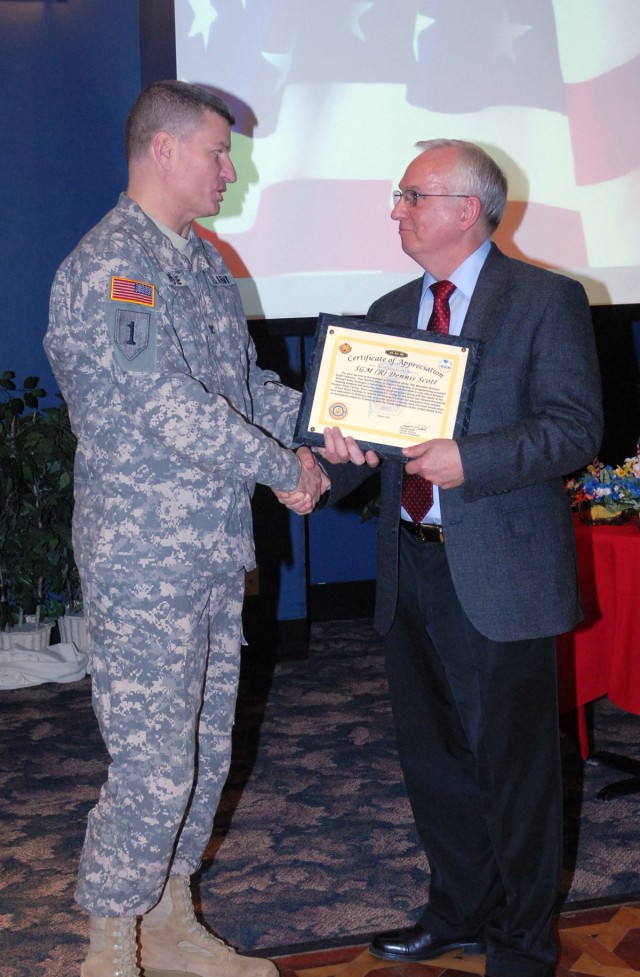
FORT DRUM, N.Y. - Fort Drum and Army Emergency Relief officials held a celebration to kick off the 2010 donation drive March 2 at the Commons.
The goal of the event is to make it known what AER does with the money it receives as well as to highlight a few of the success stories of the organization. This year's meeting focused heavily on awareness of AER and its programs.
To start the event, Col. Kenneth H. Riddle, Fort Drum garrison commander, spoke about the importance of AER and about how it helps Soldiers and their Families.
"In 2009, AER assistance reached $79 million; in the year before that, it was $83 million," Riddle said. "Here at Fort Drum, the 2009 AER assistance to our Soldiers and Families amounted to about $2 million, helping nearly 2,300 Families.
"So if you have doubts about where your money is going when you contribute your money to the AER campaign here at Fort Drum, have no doubt, we didn't put that (amount) into it. The return on our investment is really good," Riddle said.
"Also in 2009, the Fort Drum AER office provided 485 Command Referrals at nearly $370,000, which allowed Soldiers to receive immediate assistance from AER," he added.
The Command Referral is a fairly new program that allows a Soldier to receive up to $1,000 from AER with nothing more than a company commander or higher signature, no questions asked.
"With the current challenges facing our Soldiers and Families here at Fort Drum, the need for AER assistance continues to grow," Riddle said. "The success of the program depends on our support and the awareness and knowledge of the program by our junior leaders and Families."
After Riddle spoke, retired Sgt. Maj. Dennis Scott, deputy director of administration for headquarters AER, talked about AER and some of its lesser-known aspects.
"You go anywhere in the Army (and) you will have someone in the chain of command say 'we support this program,' but like most things in life, actions speak louder than words; and your actions speak here at Fort Drum," Scott said.
"I know a lot of you are here today believe that to have a successful campaign, you have to generate a lot of donations," he added. "But what I think is extremely important to have a successful campaign is to disseminate information about this organization."
One important point Scott stressed was the issue of who is eligible to use the fund.
"We have four categories of eligibility at AER," he said. "The first two are pretty much understood throughout the Army, which is all of our active-duty Soldiers and their Family Members, our National Guard and Reserve Soldiers who are on active duty for more than 30 days and their Family Members."
"Our last two categories really aren't very well-known," Scott added. "And that is our retirees and our widows and orphans. For our retirees, from AER's standpoint, we don't care when you retire, if you retire with 30 years or 15 months (because of medical reasons); when you retire, you're going to retire as a Soldier as far as we're concerned. You are still part of the Army Family, and you retain your eligibility."
Scott said his main concern was Soldiers who retired after a short amount of time because of medical reasons, as they are often unable to pay for medical bills while waiting for their retirement benefits to take effect. He wanted to make it known that survivors of fallen Soldiers also often do not know they are eligible for AER assistance.
"We recognize in most Army Families, whether the Soldier is active-duty or retired, that when the Soldier dies, the Family income stops," Scott said. "In some cases the accounts are frozen, and it's going to be a number of months before the benefits start. (AER) will help them meet their monthly expenses."
The first donation made to AER this year was on the behalf of the Family of Spc. Waide James, a Soldier who was killed in December. The check was presented to Scott by Capt. Bob McTighe, commander of Headquarters Support Company, Headquarters and Headquarters Battalion, 10th Mountain Division (LI).
"We were surprised when (James') Family approached us," McTighe said. "It was a time for grieving for them, and they still wanted to support the Army effort."
First Sgt. Mark Wokasch, HSC, HHBN, was the first to have contact with James' Family.
"James' grandfather came up to me and said he wanted to start an organization in honor of his grandson, so I told him about AER," Wokasch said. "We looked it up on the Internet, so he had a good idea of what AER did and set it up so all donations to his organization go directly to AER."

Social Sharing